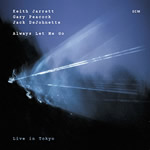|
|
 |
Dusted Reviews
Artist: Keith Jarrett / Gary Peacock / Jack DeJohnette Album: Always Let Me Go Label: ECM Review date: Apr. 16, 2003 |

|
|
|
 |
Superlatives Fall Short
Arguably the world’s preeminent piano trio, Jarrett, Peacock and DeJohnette have been an institution in improvised music for decades, almost since their inception in 1984 as an outfit originally organized to explore the rich history of jazz standards. Jarrett remains that rare breed of musician who enjoys a cart blanche arrangement with his label. Coltrane had it with Bob Thiele at Impulse and Miles maintained it with Teo Macero at Columbia, but the current economics of jazz make it a nearly impossible amenity today. Jarrett’s been able to accomplish the feat on ECM through a close relationship with producer Manfred Eicher and a compelling track record of both record sales and artistic excellence. His discography on the German label easily numbers into the middle double digits and ranges from austere Bach recitals on harpsichord to large ensemble offerings set staunchly in the jazz tradition. In recent years Jarrett’s focus has turned almost exclusively to solo performance alongside rigorous touring schedules with The Trio. Racking up dates with an almost Protestant zeal, the prolific pace of his release schedule shows little sign of subsiding. Even more impressive, the achieved standard of quality continues to set the bar for his peers.
Always Let Me Go, a double disc compendium of concert recordings released in 2002, advances the winning streak and once again substantiates why Jarrett holds the figurative keys to the ECM kingdom. Though a successor to last year’s two-disc offering of concert-rendered standards, this set actually has more in common with Inside Out, released in 2001. The latter set visited the trio veering away from their usual diet of standards and seeking out the fresh repast of spontaneous improvisation. This time out the goal seems the same, but the resulting music is anything but rote. Jarrett’s infamous vocalese surfaces routinely as a fourth voice on stage, lacing and mimicking his lines on the piano in a fashion that annoys some listeners and amuses others. Peacock and DeJohnette appear at ease with their employer’s idiosyncratic behavior and focus instead on conjuring impromptu spirits from their respective divining rods of bass and drums.
While the improvisations are largely spontaneous, a strong sense of melody and rhythm almost always underlies them. Each disc opens with a mammoth excursion clocking over a half hour in daunting duration. “Hearts In Space” moves from slightly pensive beginnings built around Jarrett’s jittering clusters and the tidal tumble of DeJohnette’s malleted drums into a more clearly defined trajectory built on traceable chords. But before the detour the trio celebrates a melodic uncertainty as DeJohnette’s swishing brush work and tilted ride cymbal accents color Peacock’s stout plucking, while the pianist stamps out segmented parcels of notes. Later sections cycle through related, but divergent variations on this style of interplay. Somewhat miraculously the action rarely lags, even when the trio seems on the verge of treading thematic water. Of particular note is a pastoral interlude into somber Americana at the track’s median, where Jarrett’s exemplary method of romantic lyricism truly flourishes. The aptly and concisely titled “Waves” works from a different framework while still maintaining similarly colossal dimensions.
The majority of other pieces, while shorter, still hover around the 14-minute range in size and scope. Of these “Tributaries” and “Tsunami” really stand out. On the former, the sparse-stepping patter of DeJohnette’s cymbals starts a journey that evolves exponentially in terms of density and momentum. Moving from modest beginnings into a dark, portentous groove dominated by stabbing block chords and the corpulent ostinato of Peacock’s bass, the piece is awash in an almost angry dysphoria. “Tsunami” highlights Jarrett’s agility behind the ivories at its onset before swirling around a comparatively tight tonal center. The close repartee of his partners pushes the pianist further as he races through a litany of laddered lines. Later, DeJohnette’s tribal-toned beats bring the piece to a fever pitch.
Perhaps the only vexing facet of the set is the inclusion of deafening applause swells at the close of many of the pieces. Jarrett’s infamous ego enjoys near-legendary status in jazz circles, but this tactic seems especially sycophantic -– the music speaks for itself without the added accolades of an adoring audience. Still, this is a minor complaint when balanced against the brilliance of the music. This set stands as a high-water mark in a folio littered with apogee-reaching efforts. Anyone with an ear for finely hewn jazz improvisation should reference this immensely involving case study in the state of the art.
By Derek Taylor
|







